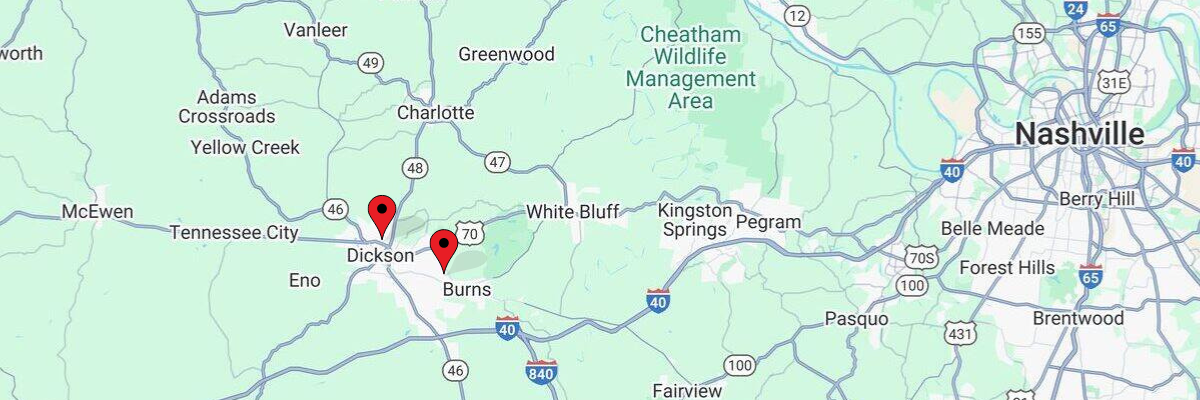Heroin Detox Services, Medication, and Programs in Nashville, TN
Freeman Recovery Center is a heroin detox center in Nashville, Tennessee. Our rehabilitation centers provide a secure and compassionate atmosphere as you begin your medical detox program. We pride ourselves on helping patients like yourself find affordable detox support and offer an assortment of payment options. A limited income shouldn’t stop you from getting the care you deserve.
At Freeman Recovery Center, our extensive rehabilitation services address issues, including Substance Use Disorders (SUDs), mental health conditions, and dual diagnosis. We specialize in drug dependency treatments, particularly for heroin addiction. Our team will assist you throughout the detoxification process. We can help you achieve optimal recovery by tailoring a plan that best suits your needs to maintain long-term sobriety. On this page, you will discover everything you need to know about heroin detox and rehab facilities, the process of addiction recovery, and the intervention strategies you will need to find sobriety.
What is Heroin Use Disorder?
Heroin Use Disorder (HUD) is a substance use disorder that is considered a chronic condition classified by the compulsive use of heroin, regardless of the negative ramifications. Heroin is a highly addictive, illegal opioid drug. Unfortunately, HUD usually results in psychological and physical drug dependence.
The defining features of HUD include substance withdrawal symptoms, negative consequences, increased tolerance and dependency, psychological impacts altering brain chemistry, and increased health risks like overdose, infections, respiratory issues, and organ damage. Treatment typically consists of Medication-Assisted Treatment (MAT), support groups for drug accountability like Narcotics Anonymous (NA), behavioral therapy, and detoxification programs like those offered at Freeman Addiction Recovery Center.

Book a Free Assessment
Contact us to schedule a free addiction or mental health assessment as part of our admissions process.
Check Your Insurance Coverage
How to Find Heroin and Opioid Detox Programs in Middle Tennessee
Freeman Recovery Center has a network of heroin detox and rehab facilities that specialize in drug treatment programs in Middle Tennessee. Our holistic approaches to drug treatment include detox therapy, counseling, structured living, and many other support services. Call (615) 645-3677 today to learn more about detoxification programs near you.
Heroin Detox Treatment in Burns, TN
Our detox facility and residential treatment center in Burns, Tennessee, will help manage your drug withdrawal by providing you with round-the-clock medical care. Our Medication-Assisted Treatment (MAT) utilizes medications, counseling, and behavioral therapies to decrease challenging withdrawal symptoms and prepare you for further treatment.
- Address: 1615 HWY 96, Burns, TN 37029
Heroin Detox Treatment in Dickson, TN
Our outpatient treatment facility for heroin addiction in Dickson, Tennessee, incorporates therapeutic and medical care to help patients like yourself continue your progress toward recovery from heroin. Our partial hospitalization programs, intensive outpatient programs, and various outpatient services address the physical and psychological symptoms. At Freeman Recovery Center, our programs focus on holistic care and evidence-based therapies.
● Address: 222 State St, Dickson, TN 37055
Check Your Insurance for Detox from Heroin

How Does Someone Become Addicted to Heroin and Other Opioids?
Addiction to heroin and other opioids is a complicated process that involves a fusion of psychological, biological, and social factors. For most people, the initial exposure to opioids comes from a seemingly innocent prescription for pain relief. Though effective for pain management, these drugs are also infamous for transporting the user into a state of euphoria.
Opioids, like heroin, bind with certain receptors in your brain, dulling your pain while simultaneously releasing dopamine. This neurotransmitter is responsible for feelings of pleasure. Thus motivating continued use of the drug. As time passes, tolerance builds up, which causes patients to take higher doses. Then, you reach the point where your body needs the drug to function. If you don’t use it, you’re plagued with withdrawal symptoms like muscle pain, anxiety, nausea, vomiting, sweating, and cravings. Opioid addiction can even change your brain, impairing your prefrontal cortex as well as your capability to withstand cravings and make sound decisions.
There are several social and psychological factors that play a role in addiction, including a high-stress environment, genetics, mental health conditions, and peer influence. Eventually, prescription drugs are too difficult to obtain, which is when most people make the switch to heroin, a cheaper and more convenient option. Breaking free from addiction requires drug treatment programs like those offered at the Freeman Drug and Alcohol Addiction Center. Call (615) 645-3677 today to learn more about our medical detox services.
What is a Heroin Detox Center in Nashville, Tennessee?
A heroin addiction medical detox center provides medically supervised support to those going through heroin withdrawal. Throughout the drug detoxification process, you will get round-the-clock care to help you cope with cravings, triggers, and withdrawal symptoms. Drug withdrawal symptoms are common during the cleansing process. There are several heroin detox facilities in Nashville, TN, including Freeman Recovery Center.
Heroin withdrawal symptoms can be quite severe, ranging from muscle pain and insomnia to vomiting, nausea, and diarrhea. Sometimes, it can even result in fever, dehydration, and seizures. Heroin detox facilities in Nashville, Tennessee, like Freeman Recovery Center, blend behavioral treatments with medical interventions. We will monitor your detox symptoms and provide the follow-up care that’s necessary for drug relapse prevention and lasting recovery.
What Medications Are Used for Heroin and Opioid Detox?
Currently, three medications have been approved by the Food and Drug Administration (FDA) to assist with heroin and opioid detox programs. These medications are effective in lessening substance withdrawal symptoms, which are physically, mentally, and emotionally challenging, and can be continued for ongoing recovery treatment. They are a tool to get you through the initial stage of recovery.
The three accepted options are:
- Methadone: This long-term medication is administered daily through a federally registered opioid treatment program. Methadone helps decrease cravings and manage withdrawal symptoms effectively.
- Buprenorphine: Buprenorphine reduces the occurrence and strength of cravings while also tackling withdrawal symptoms. It is taken daily and may be prescribed for several days at a time, allowing for less frequent clinic visits.
- Naltrexone: Unlike the other two, Naltrexone acts as an opioid blocker rather than being an opioid itself. It prevents the effects of opioids and does not induce euphoria. Naltrexone can also assist in treating alcohol use disorder. Typically, it is administered as an intramuscular injection by a physician, but it is also available in oral form.
Statistics on Heroin Detox Programs in Tennessee
Heroin detox programs in Tennessee are crucial because of the state’s growing opioid crisis. In Tennessee, opioid overdose deaths reached 3,038 in 2021, representing 80% of all drug-related fatalities in the state. The state also ranks third nationally for prescription drug abuse, with an overdose death rate of 31.2 per 100,000 residents—50.72% higher than the national average.
The Tennessee Department of Mental Health and Substance Abuse Services (TDMHSAS) strives to increase treatment accessibility. Between 2017 and 2019, the prevalence of past-year heroin use was 0.34%, aligning closely with both regional (0.25%) and national (0.30%) averages. In Davidson County alone, 162 suspected drug overdose deaths were reported in the third quarter of 2023, indicating a rising trend in annual fatalities from drug overdoses from 2016 to 2022.
What Happens Once the Heroin Detox Process is Completed?
Typically, once your detox program has come to a close, the road to recovery isn’t over. Detoxification services focus on managing your withdrawal symptoms and dealing with the physical dependence that you have on heroin. After that, you still have to deal with the emotional, behavioral, and psychological parts of addiction. That’s why detoxification is usually just the beginning.
After the acute detoxification phase, there are several steps you can take to ensure long-term recovery. Medication-assisted treatment will help prevent relapse. Drug addiction counseling can assist you by identifying the underlying cause of your addiction, changing your pattern of thinking, and encouraging your future goals. Family therapy can also be important to rebuild healthy relationships, giving you the support system that you will need; the family impact of drug addiction is multifaceted. Post-detox support can also come in the form of 12-step programs that offer peer guidance.
Having a plan to prevent possible relapse is crucial and can include outpatient treatment, regular drug testing, or a sober living home. Also, since drugs and mental health go hand-in-hand, dual diagnosis treatment might be necessary to address common co-occurring mental health issues alongside your addiction.
Do I Need to Attend Rehab After Detoxing from Heroin?
Attending rehabilitation after detoxing from heroin is highly recommended and often necessary. Detoxification is a huge milestone, but it’s only the first step to conquering heroin addiction. Detox care focuses on the physical symptoms of withdrawal. Rehab, on the other hand, will assist with the behavioral and psychological components of your addiction.
Participating in rehabilitation after drug detox is vital because it will help you build long-term tools that are essential to recovery. It will address any mental health conditions that you have, give you a support system, establish routine and structure in your life, and hinder relapse.

How Long Does Heroin Detoxification Take?
The timeline of heroin detoxification varies based on your health and level of dependency, but typically, acute withdrawal takes three to ten days. The most severe symptoms occur within the first several days, including vomiting, diarrhea, insomnia, fierce cravings, and muscle spasms. The acute phase usually ends between days seven and ten. Sometimes, though, the process can take several weeks.
The use of medications like buprenorphine (Subutex), methadone, and clonidine can reduce your cravings. This makes your detox recovery go a bit faster and much more bearable. Are you or a loved one battling addiction and want answers? Discover how our inpatient rehab center for heroin addiction can help you start your journey to recovery!
What is the Process for Short-term 1-day, 3-day, 5-day, and 7-day Heroin Addiction Detox?
The length of detoxification programs and the treatment methods employed can differ significantly from one individual to another. While some may prefer shorter outpatient detox programs, these may not always be the best option for everyone. Let’s explore the various durations of detox programs, along with their associated benefits and risks:
1-Day Rapid Substance Abuse Detox Services
A one-day rapid detoxification service is controversial and comes with a lot of risks even when medically managed. These risks include dehydration, heart issues, and even death. Even though a quick detox might sound appealing, it doesn’t actually confront your psychological cravings. It also comes with a high risk that you will relapse.
3-Day Quick Heroin Detox Programs
Similar to the one-day detoxification program, a three-day detox is attractive because it offers a quick solution, but it’s not typically the best option for long-term recovery. Three-day detoxification programs are not usually recommended because they can cause severe withdrawal symptoms and don’t give you enough time for a full recovery.
Five-Day Quick Heroin Detox Programs
Though it depends on the severity of your addiction and the type of substance, a five-day heroin detoxification program gives your body more time to recover from withdrawal symptoms. You’ll have more time to manage secondary symptoms like fatigue, irritability, and depression. You’ll also be able to reduce your medication use and experience behavioral therapy and group counseling to help with the psychological factors associated with addiction.
Providers, like Freeman Recovery Center, a heroin detox center in Nashville, TN, will help you determine the most suitable duration of drug detoxification to best meet your needs. Call (615) 645-3677 today to get an assessment from one of our specialists.
Seven-Day Quick Heroin and Opioid Detox Services
Seven-day quick heroin and opioid detoxification programs are a common choice to counteract your drug dependency, particularly if your addiction is more severe. Of course, the success of this service will depend on your body’s response and the type of substance you’ve been using.
This longer detoxification program will provide you with a better understanding of your addiction, and this will help your recovery process. Developing a relapse prevention plan is crucial to maintain sobriety. We always recommend that you get assessed by a specialist. Thankfully, there are several heroin detox facilities in Nashville, Tennessee, like Freeman Drug and Alcohol Addiction Center, that can guide you through the whole process.
What is the Process for Longer Term 10-Day 14-Day, 21-Day, and 28-Day Heroin Abuse Detox?
Longer heroin abuse detoxification programs, which range from 10 to 28 days, provide you with a comprehensive and steady method to detox recovery. These programs will give you the time you need to temper withdrawal symptoms and begin the behavioral treatments that will assist you in long-term recovery.
Programs that consist of a 10 to 14-day detoxification offer plenty of time for your body to regulate the psychological and physical challenges that come with withdrawing from heroin. A 21 or 28-day detox is the most thorough, giving patients suffering from severe addiction enough time to heal physically and psychologically. Are you unsure what detoxification program would be best for you? Call (615) 645-3677.

Does Private Health Insurance Cover Heroin or Opioid Detox Services in Tennessee?
Yes! Private health insurance typically covers heroin or opioid detox services at heroin treatment centers in Nashville, TN, and surrounding areas. The Affordable Care Act (ACA) mandates that detox therapy and treatment for substance use disorders are considered essential health benefits.
Freeman Recovery Center accepts most insurance providers. Even though insurance companies are required to include coverage for heroin detoxification, it’s important to review your specific plan and coverage details. Verify your insurance coverage today.
How Much Does Heroin or Opioid Detox Cost Without Insurance Coverage in Nashville, TN?
The cost of a heroin detox in Nashville, TN, without insurance, typically ranges from $500 a day all the way up to $30-50,000 in inpatient detox programs. These costs will vary based on the length of your stay, the type of care you receive, and other factors.
At Freeman Recovery Center, we want heroin detox therapy to be accessible to all patients. We offer flexible payment plans and sliding scale fees if you don’t have insurance. Contact us by calling (615) 645-3677 today to discuss the cost of heroin detox and recovery.
How Much Does Heroin Addiction Detox Cost with Health Insurance Support in Tennessee?
If you have health insurance, heroin detox and rehab facilities incur out-of-pocket costs anywhere between $500 to $2,000 per day in Tennessee. Your health insurance policy will highlight your level of coverage. It’s important to understand your benefits in order to grasp your financial responsibility.
Even though your insurance provider will cover a large portion of your treatment, your expenses will depend on various details. These include your plan’s copays, deductibles, and whether you use a detox facility within the insurer’s network. Sometimes, dealing with insurance is intimidating. Contact us at Freeman Recovery Center today to speak with a consultant to help you navigate the process.

Can I Self-Detox from Heroin on My Own?
Even though you have the free will to detox from heroin on your own, it is not recommended as it is potentially dangerous. Without a trained medical professional team, you risk your safety at home. Withdrawal symptoms can be so intense that they could lead you to relapse. Also, you might lack a support system to weather the storm.
Our Partial Hospitalization Program (PHP) options were created to provide you with compassionate care and support throughout drug addiction treatment. These programs are the perfect balance between inpatient treatment and traditional outpatient care. A PHP gives you the necessary treatment during the day but lets you go home to sleep in your own bed at night. We also offer Intensive Outpatient Program (IOP) support if you need more help than traditional outpatient services.
Heroin Addiction Detox: Key Statistics and Information for Tennessee
- The Kaiser Family Foundation reports that in 2021, there were 3,038 opioid overdose deaths in Tennessee, which accounted for 80% of all drug overdose deaths in the state.
- Tennessee is ranked third in the country for prescription drug abuse, according to the Tennesee Bureau of Investigation.
- The National Center for Drug Abuse Statistics indicates an overdose death rate of 31.2 deaths out of every 100,000 residents in Tennessee. This is 50.72% higher than the national average overdose death rate.
- SAMHSA’s Behavioral Health Barometer shows that during 2017-2019, the annual average prevalence of past-year heroin use in Tennessee was 0.34% (or (19,000). This is similar to both the regional average (0.25%) and the national average (0.30%).
- Nashville’s Quarterly Drug Overdose Surveillance Update revealed that during the third quarter of 2023, there were 162 suspected drug overdose deaths (85 completed and 77 pending) that occurred in Davidson County in Tennessee. The annual number of fatal drug overdoses in Davidson County has increased each year from 2016 through 2022.
Connect With Us For An Assessment Today




